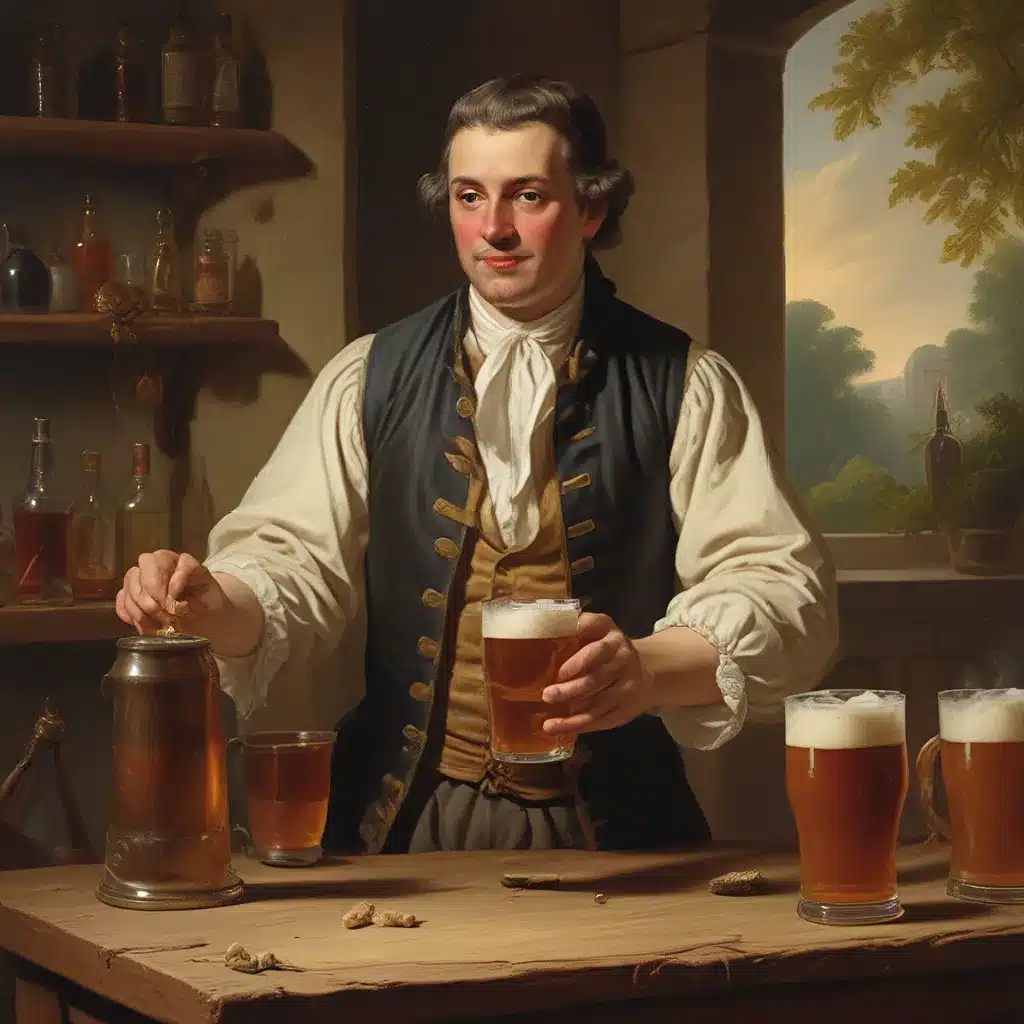
“Oh, the glory of the golden age of beer!” I sigh wistfully, as I gaze out over the dimly lit pub. The bartender nods knowingly, reaching for a frosted mug and pulling a rich, amber liquid from the tap. “Those were the days, my friend,” he murmurs, sliding the frosty glass across the worn wooden bar.
I take a reverent sip, savoring the complex flavors that dance across my tongue – caramel, toffee, with just a hint of spice. This is no ordinary beer. No, this is a portal to a bygone era, when the recipes of our colonial forefathers were jealously guarded secrets, passed down through generations of brewmasters.
As a holistic nutritionist, I’ve long been fascinated by the lost culinary traditions of our ancestors. And when it comes to beer, the colonial period was a veritable treasure trove of innovation and experimentation. From the robust porters of England to the delicate farmhouse ales of Belgium, every region had its own unique brewing culture, shaped by the local climate, ingredients, and the creativity of its artisans.
Rediscovering Lost Recipes
But alas, the march of progress and industrialization has all but erased these historic recipes from our collective consciousness. As mass-produced, homogenized beers came to dominate the market, the vibrant diversity of colonial-era brews faded into obscurity.
Until now.
You see, I’ve been on a mission to uncover these lost gems, scouring dusty archives and ancient tomes for clues to their long-forgotten formulas. And let me tell you, the journey has been nothing short of captivating.
The Robust Porters of England
Take the porter, for instance – a rich, dark ale that was the pride of 18th-century London. Brewed with a blend of malted barley, roasted grains, and even a touch of molasses, these robust beers were the fuel that powered the city’s industrious workforce.
But as the industrial revolution gained steam, the traditional methods of porter-making fell by the wayside. Brewers sought to cut costs and streamline production, and the once-glorious porter was reduced to a pale imitation of its former self.
Until, that is, a serendipitous discovery in the archives of the British Library. There, buried beneath layers of dust, I stumbled upon a yellowed manuscript detailing the original recipe for London’s legendary “Entire Butt” porter. With a triumphant grin, I set to work, carefully recreating the intricate step-by-step process.
The result? A revelation. Rich, robust, and brimming with character, this resurrected porter is a testament to the ingenuity and craftsmanship of our colonial forebears. It’s a flavor that transports you back in time, to the bustling streets of 18th-century London, where the air was thick with the scent of roasting malt and the chatter of hard-working men.
The Delicate Farmhouse Ales of Belgium
But the colonial brewing renaissance wasn’t limited to England, oh no. Across the Channel, in the verdant farmlands of Belgium, a whole different tradition was taking root.
Here, the brewers eschewed the heavy, brooding porters in favor of something more delicate and refined – the farmhouse ale. These beers, crafted with local grains and infused with the wild yeasts that danced on the summer breeze, were the embodiment of the region’s pastoral charm.
Yet, like their English counterparts, the farmhouse ales of Belgium fell victim to the relentless march of industrialization. As mass-produced lagers and pilsners flooded the market, these delicate, artisanal brews faded into the shadows, their recipes all but lost to the sands of time.
Until, that is, I stumbled upon a trove of handwritten journals in a dusty Belgian farmhouse. Within their pages, I discovered the secrets of the legendary Saison – a refreshing, peppery ale that once quenched the thirst of rural laborers. With a newfound determination, I set out to revive this forgotten treasure, painstakingly recreating the traditional techniques and ingredients.
The result? A revelation. Bright, effervescent, and brimming with the earthy, floral notes of the Belgian countryside, this resurrected Saison is a masterpiece of balance and complexity. It’s a beer that whispers of the past, of a time when the rhythms of nature were the heartbeat that guided the brewers’ craft.
The Joy of Discovery
As I savor the final sips of my colonial-era porter, I can’t help but feel a sense of wonder and excitement. This is the true essence of beer – not the mass-produced, homogenized swill that dominates the modern market, but the vibrant, ever-changing tapestry of flavors and traditions that have been woven throughout history.
And the best part? The journey has only just begun. There are so many more lost recipes to uncover, so many more forgotten tales to rediscover. From the robust, spice-infused ales of the American colonies to the delicate, barrel-aged brews of the European continent, the world of colonial-era beer is a veritable treasure trove waiting to be explored.
So come, my friends, join me on this adventure. Let’s raise a glass to the ingenuity and creativity of our forebears, and revel in the joy of rediscovering the lost recipes that have shaped the very essence of beer. The future of beer is in the past, and it’s time to bring these forgotten gems back to life.

